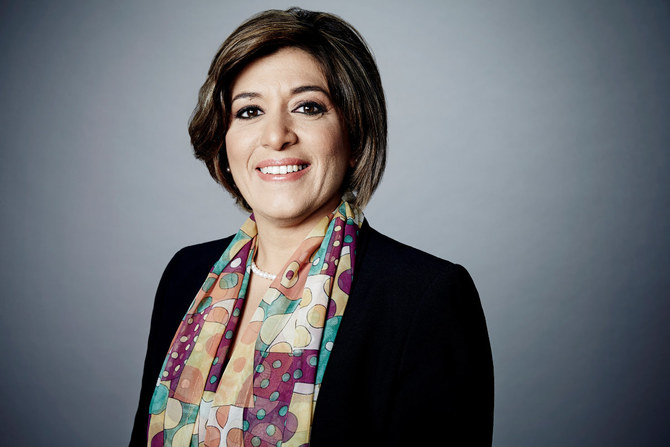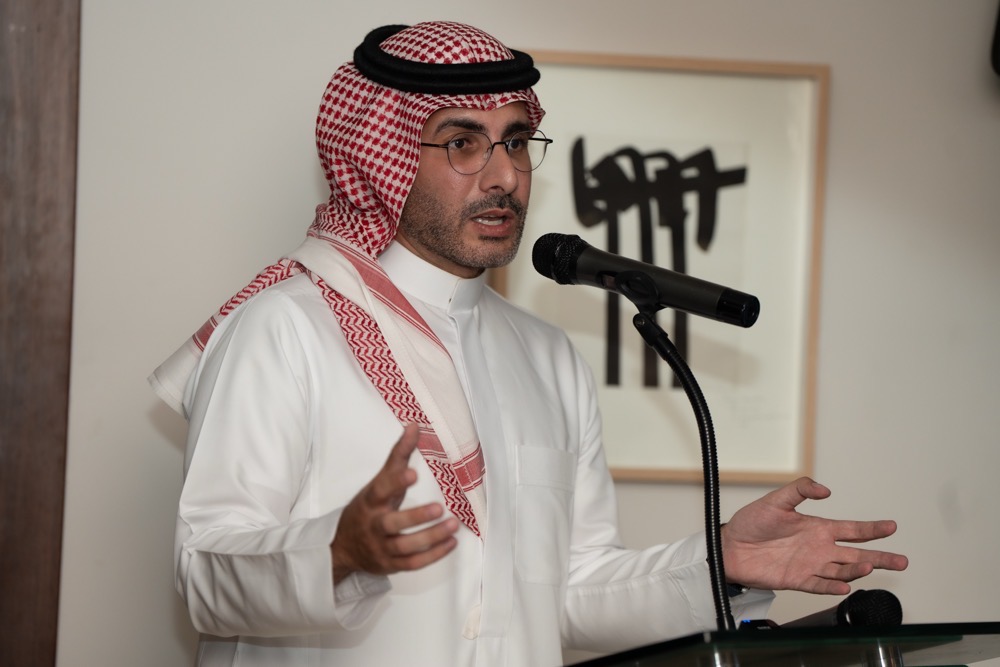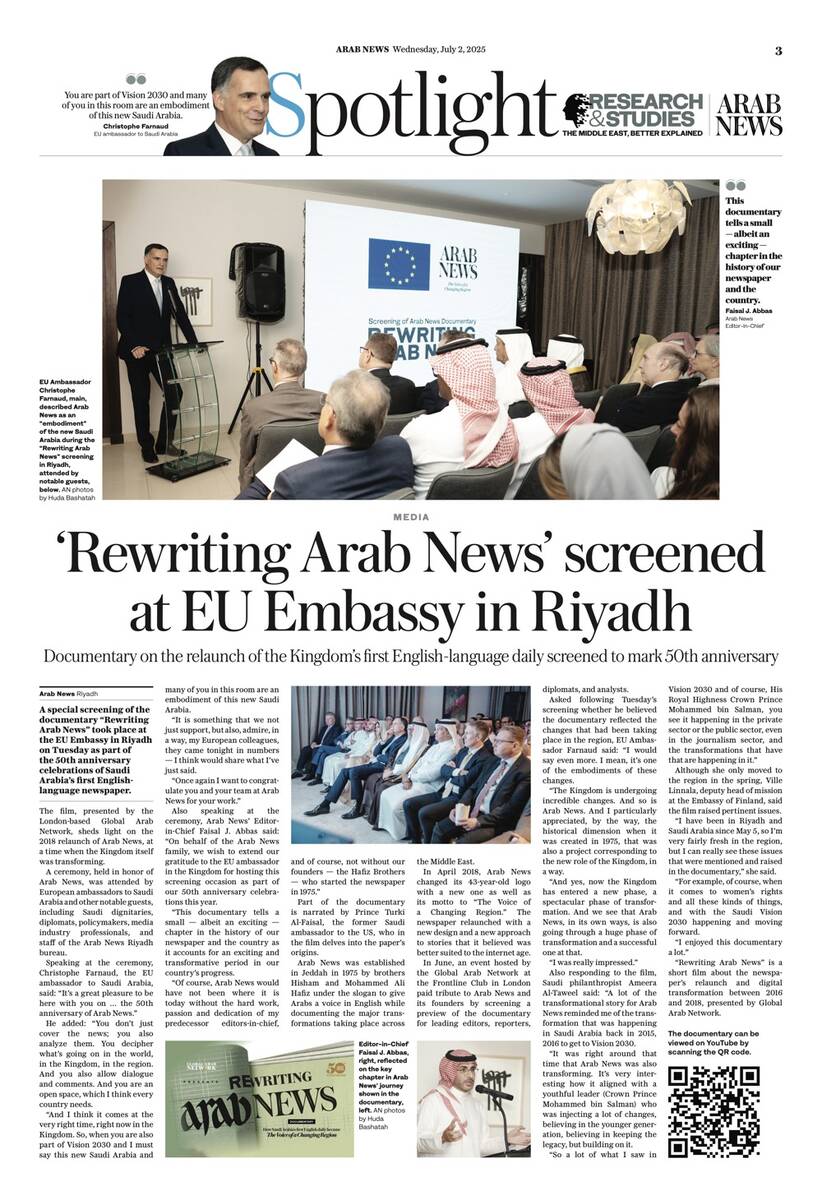DUBAI: With more and more people consuming news online, it has become increasingly important for news outlets — print or TV — to digitize their offerings.
CNN, one of the biggest news outlets in the world, broke all records last year with CNN Digital reaching its largest and most engaged global audience. In the region, CNN Arabic registered its highest year on record for average monthly unique visitors, which was up 34 percent from 2019 largely driven by record-high levels of mobile consumption which grew by 24 percent from 2019.
Arab News spoke to Caroline Faraj, vice president for Arabic Services at CNN, to learn more about the growth story and future strategy of CNN Arabic.
Can you share how much of the traffic is organic, versus from other sources such as social media?
It is a significant strength and differentiator that the vast majority of CNN Digital and CNN Arabic’s traffic comes to us directly. CNN is one of the few remaining destinations on the Internet where people seek out our home page or coverage of a particular story as they associate us with trusted news and information. While it is important for us to have a social presence, we are much less reliant on traffic referral from those platforms than other media due to the strength of our brand, both globally and with CNN Arabic.
What is the strategy to drive growth?
CNN Arabic is the Middle East’s leading independent news platform. What makes us stand out is that independence and our credible, authentic, factful reporting and the huge trust in the CNN brand which has tremendous value for our audience. We offer a global perspective, both on international news and on stories that are more regionally relevant or focused.
Being part of the world’s largest news network, with journalists working on stories from every continent, is an enormous asset in terms of the renowned quality of our journalism, the resources and wealth of talent in our teams and the recognition and confidence that the audience has in us. As we’ve seen with the record audience numbers, CNN is more essential than ever before in providing trusted news.
Our audience is powerful; the caliber of our audience differentiates us from other news media. Political leaders, CEOs, celebrities and people at the top of their industry, actively share, reference and act upon our reporting. We reach these audiences at scale including opinion-formers, change-makers, high-spenders, travelers and business decision-makers.
Having an impact, creating change and being an essential trusted news source is key to maintaining and driving growth among our influential audience and reaching new and younger audiences.
Analysis from a recent brand study that we conducted showed that with the news events of 2020 and the outlook for 2021, 91 percent of consumers from the Middle East and Africa region feel the role of international news media is now more important than ever.
Our strategy is based on constant innovation and responding to the audience and their consumption habits, the formats and the stories that they’re engaging with. The closer we are to our audience the better we are in offering and curating the content they are interested in.
Underpinning everything is a data-led approach that analyzes audience trends and behavior to give insight on where we can grow and serve our audience even better in the future. For example, our analysis shows that our Arabic audience expands well beyond the region and there are growth opportunities with Arabic speakers in the US. Along with breaking news, we know that business, technology, travel, sports and entertainment are key areas of interest for our audiences.
Another area for growth is in our products such as audio and newsletters. Globally downloads of CNN audio content increased by over 75 percent in 2020 compared to 2019 and there’s been a huge demand for CNN newsletters as subscriptions grew by 90 percent in 2020 compared to 2019. We’re currently developing concepts for Arabic audiences.
How did CNN Arabic adapt to digital and mobile?
CNN Arabic has been a digital destination from the outset when we launched almost 20 years ago. As a digital-first brand, we have been well ahead of many of the competitors. Mobile has been at the core of our offering ever since the introduction of the smartphone. It will remain a focus, in line with the Middle Eastern audience’s preference, as we’re currently seeing the majority of traffic on mobile, which is at almost 90 percent in some cases.
What are your plans for the future?
We are listening to our audience’s needs and making changes as part of our commitment to them. Plans include expanding into audio and newsletters, which as I mentioned we’re seeing huge growth in globally. The product portfolio will grow, content formats will evolve and become more immersive and we’re exploring a move into events.
An area that I am very passionate about is training the next generation of journalists. For many years we’ve offered internships at CNN Arabic; we’ve had more than 120 interns from around the world and have provided training courses in the region. This has been formalized this year through the CNN Academy Abu Dhabi, which I was proud to be part of. As we look to the future, I am keen for CNN Arabic to bring this level of training for Arabic speakers that want to learn about the skills of our trade.
From a commercial perspective, we are also looking forward to working with more brands. CNN Arabic is the ideal platform if an advertiser wants to reach Arabic audiences at scale in a premium environment. We work closely with our commercial partners to develop innovative solutions and ensure that their messages cut through in sponsorships, digital advertising and audience targeting.
How has news media changed in the past few years – especially during the pandemic – both from a user consumption perspective as well as from a media owner perspective?
People can get news in numerous different ways and are surrounded by so many of sources of information. The pandemic has certainly prompted behavioral changes and accelerated the need and appreciation for factual, trustworthy and accurate reporting. With the growing prevalence of information sources, people are turning to brands they trust for news and information. We’ve seen that with our record-breaking traffic. Even though there are more sources than ever, and more platforms than ever, we had our best year on record.
We’ve also seen changes in consumption habits with round the clock engagement as audiences are regularly checking in on the latest news on their phone and we’re seeing high demand for video content.
What are your thoughts on the relationship between news media and companies such as Facebook and Google and the consequent idea of these companies compensating publishers?
We work with all the major platforms, and last year we partnered with Facebook on a campaign about maintaining community and connection during Ramadan.
When working with any of the platforms, publishers need to have a path to revenue. It’s important for us to have a presence on various platforms, but our focus is on our owned and operated platforms, such as with the move of the Go There show from Facebook onto our own website and mobile apps.






























